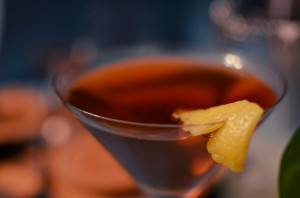Every Sunday night at seven o’clock, People Lounge transforms into more than just a bar. Regulars and spontaneous IPA-sipping patrons go elsewhere as this particular space is now absorbed into the fantastical world of Potion: A Play in Three Cocktails. Scanning the room, spectators try to piece together some expectation of the next hour and a half—after all, what on earth is a “spoken word opera?” And how can a full-length play take place in a small, dark bar on the Lower East Side? Not even the playwright, Kiran Rikhye, or director, Jon Stancato, knew the answers to these questions months prior. So began the experiment.
The intertextual acrobatics Kiran Rikhye choreographs and Jon Stancato executes left me amazed. While Kiran doesn’t have a formal background in music, she is a long time lover of the opera. However, a “spoken word opera” is not something that Kiran approached with a model or known destination. In fact, she describes her writing process as one that grew and changed over time as she developed a system. Incorporating arias, duets, and trios from Rigoletto, L’Elisir d’Amore, The Marriage of Figaro, and The Barber of Seville, she wove together a diverse script, held together by a multiplicity of rhythms. With a cast list that reminiscent of s Shakespearean comedy, Potion tells the story of burgeoning lovers, a humorous side-kick, and a doomed anti-hero. In this world, a musician accompanies almost every single moment, and a mixologist has the power to concoct magical potions capable of changing who you are.
The show is structurally interactive, which is what struck me the most. Audience members were served “potions,” or cocktails, throughout the evening as the story unraveled. Dark red and pale saffron liquids were handed out in abnormally shaped vials, reminiscent of a laboratory experiment. While I sat there in the bar-audience, sipping on drinks concocted and titled specifically for us, I was struck by the co-evolution of my emotional experience and the plot. In a somewhat tongue-in-cheek manner, the cocktails were titled carefully in order to cultivate the audience’s emotional investment in the unfurling plot. With each sip, I decided to partake in this theatrical experiment, and before I knew it, I found myself deeply searching for the sensations that the cocktails claimed to spark. As you may imagine, the search itself has the power to instill new sensation—a process that happens so quickly, it could easily pass by without notice. The simulated and the actual began to merge—the pretend and the true. I remember learning this lesson many times as a child: I would intentionally frighten myself of the dark for the sheer excitement and would subsequently have to sleep in my mother’s bed. Sitting in the audience, I began to wonder if what I was feeling would have existed if I hadn’t watered those seeds of curiosity and anticipation.
As a related aside, a Polish Hypnotherapist gave me some valuable advice a few months back. She caught me yawning at work, after which I explained that I was trying to wean myself off of coffee to find a healthier source of energy. She told me to make rosemary tea—that it has a very natural but powerful buzz. I thanked her for the suggestion, and remarked, “I’ll try it! But I don’t know if it will be enough for me.” To which she replied, “It won’t. If you go into it thinking that way, it will not work. I can tell you now. It’s all mental.”
Potions take many forms. And I’m not simply referring to your morning coffee or a stiff gin gimlet. We concoct internal potions all day long—potions that color our sensational experience of the world around us. We feed certain feelings, we squelch others; we seek out particular people, avoid others. The brain has the seemingly boundless flexibility to feel anything given the recipe and the commitment to that recipe.
After the performance, I walked up Second Avenue somewhat taken aback by my unexpected introspective unearthing in this downtown bar. And maybe it was the absinthe, but I wondered what it would be like to tap into my psychological pantry, and cook up the sensations I hope to dine on. To be honest, I don’t really know where to begin. But I heard once that happiness, along with the rest, is all about perspective. Such a revelation of freedom is daunting. But we have been cooking up potions for years. For example, how many times in our days do we stop to acknowledge how stressed out we are? For me, the number is high, and it feels all the more real and intractable each time. And I wonder: how many times in our days do we stop to acknowledge and profess the ways we are happy? Too often do I hear crickets.
Potion: A Play in Three Cocktails: this small opening could be nothing more than a simple and humble invitation to pause. To look at what we’re brewing. Maybe sip.

